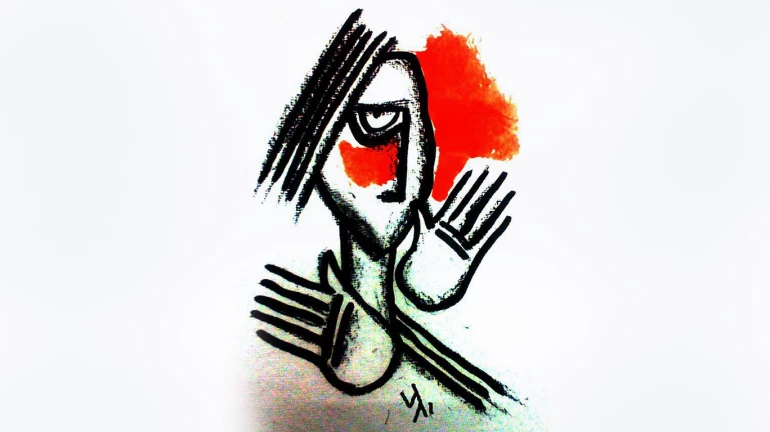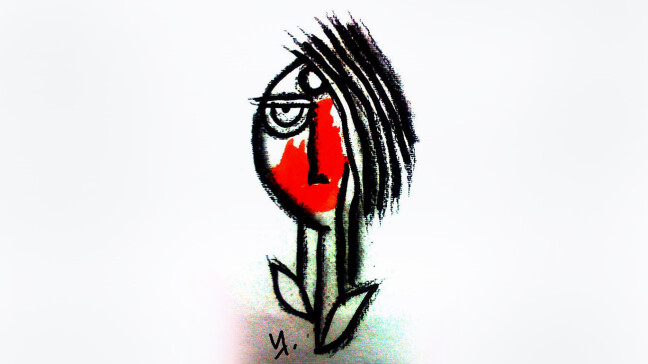
It is difficult to live in a patriarchal society and on many occasions, the patriarchy is quite blatant. A judgement is easily passed about women in the society.
Right from her dressing choice to her life decisions, at every point there is some remark which is passed from the society, questioning the woman's choice in the first place. When patriarchy and male chauvinism takes an ugly turn, step in — molestation and physical abuse.

All these sentiments and more has been portrayed beautifully by two girls whose act not only touches the heart, but gives people a different perspective.
‘When we talk about rape’ focuses on how girls believe that they are confident but there are people out there to rattle that state of presence.
How a word ‘NO’ fails when it comes to stopping a guy or a man from crossing limits and doing the unthinkable.
Akanksha (17), the brain behind this piece, wanted to break down the idea of rape and see how it affects victims at their core. She also wanted to emphasise how victims are not unknown beings who people can’t understand, but real living, breathing humans, who have known and seen every single day of their lives.
"The term ‘rape’ has always filled me with a plethora of emotions – anger, fear, confusion, and disgust amongst many others. Writing this piece was a journey for me as well, as I tried to work through what rape really meant to me. As I poured out my own experiences into this poem, such as the ‘talk’ with my mother, my training in martial arts, and my experience with inappropriate sexual behaviour, I realised that rape to me meant my loss of confidence. It was my first moment of clarity with regards to rape – realising that it was a loss of trust and confidence in not only others but one’s self as well."
Akanksha also spoke about men not being able to accept "No" as an answer, adding that we have a toxic culture that surrounds the word.
'Friendzone' is a ridiculous concept, where a woman cannot say ‘no’ to a man who wishes to date her, just because he has been supportive to her, nice and loving, or the way ‘no’ has been clouded to sound like a challenge rather than a refusal, ‘no’ has apparently lost all meaning. The word must be redefined for those who do not understand it – ‘no’ means ‘no’"
17-year-old Poorvika Mehra cried the first time when she read the piece and decided to perform it with Akanksha.
There is so much cultural specificity when it comes to rape in India, with our perception of women as the purer sex, the weaker sex. We see the rape of women as something that might shame the family when the reality is that it has nothing to do with the family, and everything to do with the loss of a woman's autonomy over her body. Women don't report rape today because of this kind of mindset, where they fear bringing shame onto their families or being shamed for being 'dirty.' This mindset is saddening but real, and it is a reality I am actively working to change.
Poorvika wants this poem to help men and women to come forward with such experiences, give them courage and a sense of not being alone.
"I could be rote here and tell you that a woman can fight off her abuser or scream or run. But, the reality is that there usually is a third instinct that takes over, an instinct we don't talk about and aren't taught about- freezing. In such situations, many people find themselves freezing. I think the most important thing I'd like to tell anyone who's been sexually abused is that freezing does not make them weak. It should not make them feel ashamed. Freezing does not give anyone an excuse to violate them, or for people to later question them as to why they did not fight their abuser off? Freezing is a natural instinct, and they need to forgive themselves for it because they are NOT to blame in this scenario."
Aranya Johar, who is a well-known slam poet and a young activist has curated the piece and feels proud of the girls.
I happen to see them perform at one of their school poetry events where I was judging with other poets. I was almost moved to tears. When I love some art, the first thing I do is I share it with the world. When I met them, I told them, that whoever will listen to this piece will feel stronger. I worked for two months with them, on their piece and on their content and performance. I was honoured to talk to them and resonated with the piece. Many people compared their piece with mine and I was really honoured," Aranya Johar, Slam Poet.
About Poorvika
Poorvika has written a poetry and has performed at an event hosted in Delhi by the Kailash Satyarthi Children's Foundation and RedFM to raise awareness about Child Sexual Abuse.
About Akanksha
Though this was Akanksha’s first performance, she and Poorvika had performed it earlier at the KalaKar competition, an event held at their school. She has also performed poetry at youth events in Mumbai. Apart from this, she has her own collection of poetry called ‘All We Could Have Drowned’ which is available on Amazon and Flipkart.





